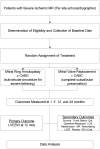Optimal surgical management of severe ischemic mitral regurgitation: to repair or to replace?
- PMID: 22054660
- PMCID: PMC4052705
- DOI: 10.1016/j.jtcvs.2011.05.030
Optimal surgical management of severe ischemic mitral regurgitation: to repair or to replace?
Abstract
Background: Ischemic mitral regurgitation, a complication of myocardial infarction and coronary artery disease more generally, is associated with a high mortality rate and is estimated to affect 2.8 million Americans. With 1-year mortality rates as high as 40%, recent practice guidelines of professional societies recommend repair or replacement, but there remains a lack of conclusive evidence supporting either intervention. The choice between therapeutic options is characterized by the trade-off between reduced operative morbidity and mortality with repair versus a better long-term correction of mitral insufficiency with replacement. The long-term benefits of repair versus replacement remain unknown, which has led to significant variation in surgical practice.
Methods and results: This article describes the design of a prospective randomized clinical trial to evaluate the safety and effectiveness of mitral valve repair and replacement in patients with severe ischemic mitral regurgitation. This trial is being conducted as part of the Cardiothoracic Surgical Trials Network. This article addresses challenges in selecting a feasible primary end point, characterizing the target population (including the degree of mitral regurgitation) and analytical challenges in this high mortality disease.
Conclusions: The article concludes by discussing the importance of information on functional status, survival, neurocognition, quality of life, and cardiac physiology in therapeutic decision making.
Copyright © 2012. Published by Mosby, Inc.
References
-
- Borger MA, Alam A, Murphy PM, et al. Chronic ischemic mitral regurgitation: Repair, replace or rethink? Ann Thorac Surg. 2006;81:1153–1161. - PubMed
-
- Gorman RC, Gorman JI, Edmunds LH., Jr . Ischemic mitral regurgitation. In: Cohn LH, Edmunds LH Jr, editors. Cardiac Surgery in the Adult. New York: McGraw-Hill; 2003. pp. 751–769.
-
- Lamas GA, Mitchell GF, Flaker GC, et al. Clinical significance of mitral regurgitation after acute myocardial infarction. Circulation. 1997;96:827–833. - PubMed
-
- Grigioni F, Enriques-Serrano M, Zehr KJ, et al. Ischemic mitral regurgitation: Long-term outcome and prognostic implications with quantitative doppler assessment. Circulation. 2001;103:1759–1764. - PubMed
-
- Hickey MS, Smith LR, Muhlbaier LH, et al. Current prognosis of ischemic mitral regurgitation: Implications for future management. Circulation. 1988;78(Suppl):I51–9. - PubMed
Publication types
MeSH terms
Grants and funding
LinkOut - more resources
Full Text Sources


